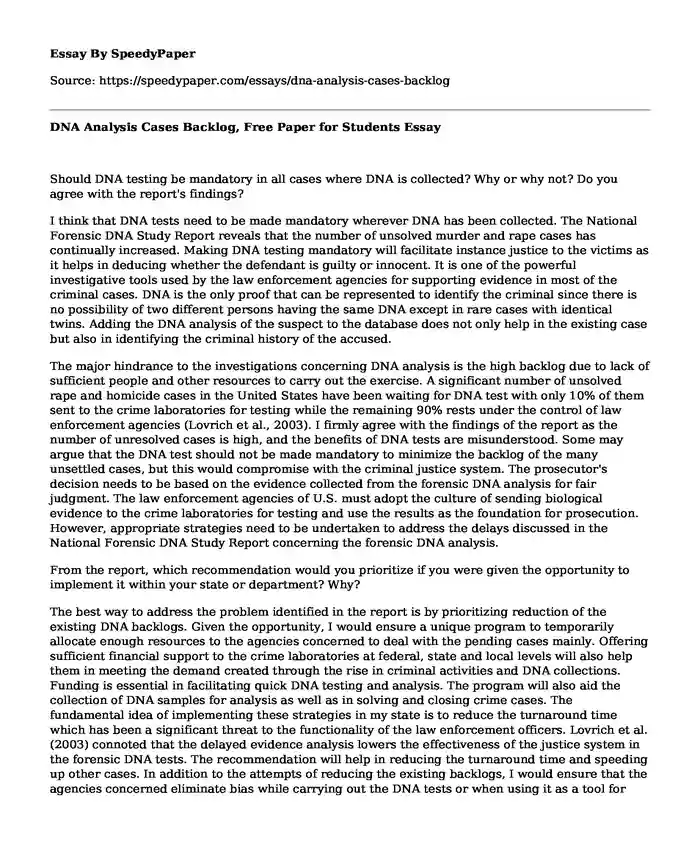
| Type of paper: | Course work |
| Categories: | Forensic science |
| Pages: | 3 |
| Wordcount: | 628 words |
Should DNA testing be mandatory in all cases where DNA is collected? Why or why not? Do you agree with the report's findings?
I think that DNA tests need to be made mandatory wherever DNA has been collected. The National Forensic DNA Study Report reveals that the number of unsolved murder and rape cases has continually increased. Making DNA testing mandatory will facilitate instance justice to the victims as it helps in deducing whether the defendant is guilty or innocent. It is one of the powerful investigative tools used by the law enforcement agencies for supporting evidence in most of the criminal cases. DNA is the only proof that can be represented to identify the criminal since there is no possibility of two different persons having the same DNA except in rare cases with identical twins. Adding the DNA analysis of the suspect to the database does not only help in the existing case but also in identifying the criminal history of the accused.
The major hindrance to the investigations concerning DNA analysis is the high backlog due to lack of sufficient people and other resources to carry out the exercise. A significant number of unsolved rape and homicide cases in the United States have been waiting for DNA test with only 10% of them sent to the crime laboratories for testing while the remaining 90% rests under the control of law enforcement agencies (Lovrich et al., 2003). I firmly agree with the findings of the report as the number of unresolved cases is high, and the benefits of DNA tests are misunderstood. Some may argue that the DNA test should not be made mandatory to minimize the backlog of the many unsettled cases, but this would compromise with the criminal justice system. The prosecutor's decision needs to be based on the evidence collected from the forensic DNA analysis for fair judgment. The law enforcement agencies of U.S. must adopt the culture of sending biological evidence to the crime laboratories for testing and use the results as the foundation for prosecution. However, appropriate strategies need to be undertaken to address the delays discussed in the National Forensic DNA Study Report concerning the forensic DNA analysis.
From the report, which recommendation would you prioritize if you were given the opportunity to implement it within your state or department? Why?
The best way to address the problem identified in the report is by prioritizing reduction of the existing DNA backlogs. Given the opportunity, I would ensure a unique program to temporarily allocate enough resources to the agencies concerned to deal with the pending cases mainly. Offering sufficient financial support to the crime laboratories at federal, state and local levels will also help them in meeting the demand created through the rise in criminal activities and DNA collections. Funding is essential in facilitating quick DNA testing and analysis. The program will also aid the collection of DNA samples for analysis as well as in solving and closing crime cases. The fundamental idea of implementing these strategies in my state is to reduce the turnaround time which has been a significant threat to the functionality of the law enforcement officers. Lovrich et al. (2003) connoted that the delayed evidence analysis lowers the effectiveness of the justice system in the forensic DNA tests. The recommendation will help in reducing the turnaround time and speeding up other cases. In addition to the attempts of reducing the existing backlogs, I would ensure that the agencies concerned eliminate bias while carrying out the DNA tests or when using it as a tool for prosecution.
References
Lovrich, N., Pratt, T., Gaffney, M., Johnson, C., Asplen, H., Hurst, H., & Schellberg, T. (2003). National Forensic DNA Study Report, Final Report. Retrieved from https://www.ncjrs.gov/pdffiles1/nij/grants/203970.pdf
Cite this page
DNA Analysis Cases Backlog, Free Paper for Students. (2022, Jul 08). Retrieved from https://speedypaper.com/essays/dna-analysis-cases-backlog
Request Removal
If you are the original author of this essay and no longer wish to have it published on the SpeedyPaper website, please click below to request its removal:
- Free Essay with a Persuasive Speech on Recycling
- Free Essay on a Child With Learning Disability
- Classical Music with Dmitry Shostakovich - Essay Exampe
- Free Essay with a Research on Body Image of College Students
- Abstaining From THC - Paper Example
- Supporting Significant Life Event in Health and Social Care
- Paper Example. The North Coast Masks
Popular categories




